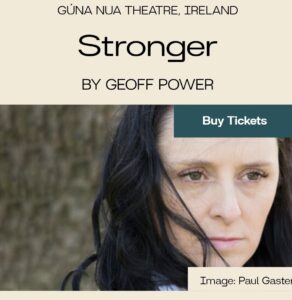
Stronger – Review by Dr. Fionnuala Brennan (Programme Leader, Higher Certificate in Custodial Care, Waterford Institute of Technology) and Raphael O’Keeffe (Assistant Governor, Wheatfield Prison)
Theatre makes space for stories to be told and voices to be heard. This, too, is the aim of restorative practice and restorative justice. Both confront us with experiences that can be hard to listen to. The thought of sitting with uncomfortable stories is never easy – whether it is going to a challenging play, or opening a difficult conversation. Preparing for a restorative conference is a long, difficult process that can only happen with the skill and experience of supporting professionals. ‘Stronger’ takes us through that process from the perspective of Janice, a teacher who has been raped by Damon, a student known to her. Janice teaches art in a school we take to be for young people with a history of offending. As we write this, we’re looking for the right language to describe the school, dismissing words like ‘juvenile delinquents’, and considering words like ‘early school-leavers’. That challenge of language – the words we use for people and events, and the impact that has on the people involved in those events – is something that stood out from the play and the subsequent enlightening panel discussion.
As the play unfolds, the character of Janice encourages that of Damon to develop his artistic potential. One lunchtime, when the school is empty of staff and students, Damon rapes her. He steals her car and later crashes it. He is arrested and ultimately pleads guilty to the charges. There are many times in the play when the power of language is highlighted – both in relation to the words we don’t use and the words we do – and the play shows us the impact of those words on Janice. Her loving husband, for example, struggles to know how to be supportive. He cannot bring himself to use the word ‘rape’ to describe what happened, which in turn frustrates and angers Janice. Does she feel this as a denial of what took place? In court, the judge tells Damon that he has ‘ruined this woman’s life’, to which she reacts with a scream. However, we don’t get to hear more about what Janice has to say to this, or to her experience: because Damon pleads guilty, Janice doesn’t have an opportunity to speak in court at all.
Restorative practice asks us to develop relationships where we talk and do things with people, rather than to or for them. When we do things with people, they retain some agency and control. This seems to be the crux of the problem for Janice: other people have decided the outcome of the rape and the appropriate justice. While Damon receives a custodial sentence, Janice says: ‘I still have to fix myself’. She persists in seeking an opportunity to speak with Damon, to ask questions and to have her voice heard. She wants to take back agency and control. When the restorative meeting with Damon eventually takes place, despite the lack of support provided by most of the people around her, the audience is given the sense that it helps her move forward in her healing journey; in ‘fixing’ herself.
We left the theatre with a number of questions, which is rather the point of going to the theatre. It was fantastic to hear these being teased out at the panel discussion. Noeline Blackwell of the Dublin Rape Crisis Centre outlined that the terms ‘victim’, ‘survivor’ and ‘injured party’ can all be used, depending on which term is the preference of the person who has suffered. And it’s that choice and agency around telling your own story and choosing your own terms that Janice does not feel she has been allowed in the criminal justice system. As the playwright, Geoff Power, points out, for Janice it’s not about the sentence. Strang and Braithwaite talk about the restorative justice process as a way of rebuilding relationships. The teacher-student relationship that existed did not prevent the crime, but it did provide the frame within which Janice and Damon could move to think about the restorative path. In the restorative meeting. Janice repeats the question ‘why’, but Damon is unable to give her an answer to this – maybe because there is no answer. Is it necessary for questions to be answered in a restorative meeting in order for it to promote healing? In the panel discussion, Tim Chapman shared the experience of an RJ participant he has worked with, who found that the process was not so much about finding answers to the questions. Rather, it was about losing the questions from their own mind.
‘Stronger’ and other creative expressions of crime, injury and healing, provide a crucial platform for discussion, a safe space to learn the language to tell the most difficult stories, and a way to support those who have stories to tell.
To keep up with news of the play on social media, follow Guna Nua on:
Twitter: @GunaNuaTheatre
Instagram: @gunanuatheatre
Facebook: www.facebook.com/gunanuatheatrecompany
Hashtags: #strongertheplay #dtf21 #irishtheatre #gunanua2021
Dublin Theatre Festival
Facebook: www.facebook.com/DublinTheatreFestival
Twitter: @DubTheatreFest
Instagram: @dublintheatrefestival
